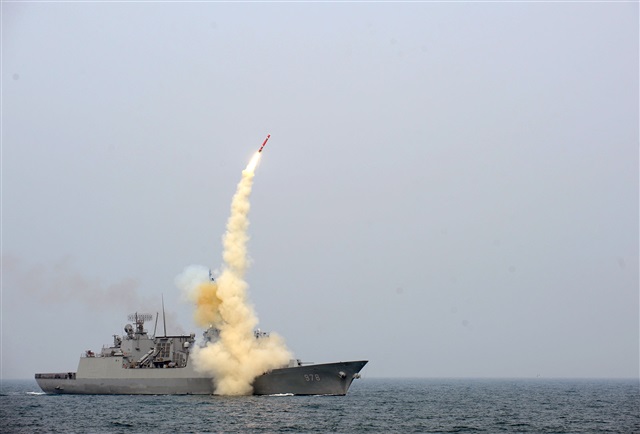The defense sector has long been a significant contributor to global carbon emissions, and now, according to Dr. Shr-Yi Chin, an expert in sustainability and carbon management, it's time for the industry to face the challenge head-on. Speaking on the topic of sustainability, he emphasized the urgent need for the defense industry to take serious action toward reducing its carbon footprint, which is responsible for a significant portion of many nations' overall emissions.
Dr. Chin highlighted the substantial role defense operations play in exacerbating climate change, noting that military activities, from logistics and equipment production to energy consumption, are major sources of greenhouse gases. The US Department of Defense, for example, emits more than 56 million tons of carbon dioxide (CO2) each year, with 60% of those emissions coming from vehicles, aircraft, and ships.
This is a common theme across militaries worldwide, where defense emissions frequently account for over 50% of government totals. These emissions, Chin warned, could severely impact a country's ability to meet its international climate targets under frameworks like the Paris Agreement.

Credit: AFP
A Hidden Challenge: Carbon Footprints and National Security
However, Dr. Chin pointed out that the defense sector faces a unique dilemma. Disclosing carbon emissions might inadvertently reveal strategic military information, as analysts could potentially reverse-engineer the data to gain insights into the production and deployment of military assets.
This conflict between maintaining operational security and the need for transparency in carbon emissions creates a complex challenge for policymakers. He suggested that advanced carbon management systems could help address this issue, allowing for reduced emissions without compromising security.
On the international stage, Europe has taken notable steps to tackle this issue. Dr. Chin praised the European Union's efforts, such as the EU Horizon Program and the Sustainable Energy Investment Forum, which focus on reducing emissions across defense sectors by integrating renewable energy and improving efficiency.
These initiatives, he argued, set a strong example for the rest of the world. Yet, in regions like Taiwan, progress remains slow. Dr. Chin urged Taiwan to follow the lead of the US and the EU, which have laid out comprehensive defense decarbonization strategies.

Credit: AFP
AI and Green Defense: The Future of Sustainable Military Operations
In addition to policy shifts, Dr. Chin believes that AI could be a transformative force in reducing military emissions. By optimizing logistics, reducing unnecessary fuel consumption, and streamlining operations, AI can help slash carbon output. But, he cautioned, AI itself consumes a vast amount of energy, creating another challenge: how to deploy AI in a way that supports environmental goals without exacerbating energy consumption.
Climate change also presents direct risks to military infrastructure. As natural disasters like floods, storms, and droughts become more frequent, military installations are increasingly vulnerable to damage, posing risks to operational readiness and energy security. Dr. Chin emphasized the significant costs associated with climate-related damages, pointing out that between 1980 and 2020, weather-related incidents resulted in economic losses of up to EUR5.2 trillion across the EU.

Credit: AFP
The Role of International Collaboration and Policy
Global defense leaders are taking notice. Former US Secretary of Defense Lloyd Austin described climate change as a "threat to our nation's security," and the EU has implemented defense decarbonization roadmaps as part of its broader Green Deal. In the UK, the Ministry of Defence has pledged to contribute to the country's net-zero goals by 2050. Meanwhile, France has adopted a three-pillar strategy aimed at achieving climate neutrality in its armed forces by mid-century.
European Defence Agency (EDA) Deputy Chief Executive André Denk once said, "The EU's goal of becoming climate neutral by 2050 cannot be achieved without the involvement of the defense sector, which may be responsible for up to 5.5% of the world's total CO2 emissions."

Credit: AFP
However, Dr. Chin noted that while these targets are ambitious, there are still significant barriers to full implementation. Achieving these goals will require difficult decisions, substantial investment, and extensive innovation to ensure that military operations remain robust while reducing their environmental impact.
Taiwan's Lagging Efforts and the Path Forward
Taiwan, Dr. Chin observed, is notably lagging in this area. While industries like semiconductors have made strides in environmental sustainability, the defense sector has yet to adopt similar strategies. He pointed to Taiwan's continued reliance on fossil fuels as a critical issue, urging the nation to pivot toward renewable energy sources such as solar and wind to help meet its carbon neutrality targets. He also advocated for the introduction of carbon accounting practices within the defense industry to track emissions and prioritize reductions across supply chains.

Credit: AFP
The defense sector, Dr. Chin argued, must not be exempt from global efforts to combat climate change. Failure to address these emissions not only hinders a country's environmental commitments but also increases the risks posed by climate-related threats to military operations. He believes that the solution lies in leveraging new technologies, fostering international collaboration, and adopting renewable energy sources within the defense framework.
As nations face the dual challenges of national security and environmental sustainability, integrating sustainability into military operations is essential for both environmental reasons and future operational readiness.

Credit: Dr. Chin



